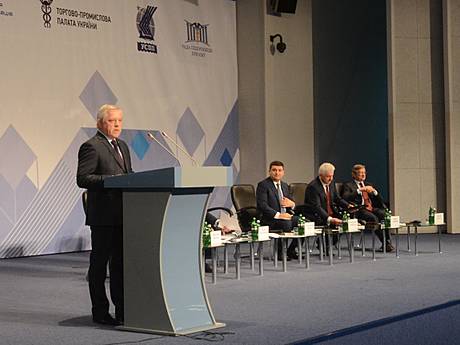
The first signs of stabilization of the national economy – 2.3% GDP growth after a long-lasting decline, an increase in budget revenue, etc. – are still insufficient and do not indicate the end of the crisis. Businesses are concerned about a shortage of working capital, expensive loans, the fiscal burden, growing tariffs and a trend towards a lack of specialists in the domestic market. These and other unresolved issues put the brakes on the development of the business environment, inflows of investment, an increase in the solvency of the population. Instead, exports are on the decline, and the economy is still oriented to raw materials. The business community has called on the government and its head, Volodymyr Groysman, to set a course for rapid economic growth and work in this direction together with the corporate sector. This was discussed at the Ukrainian Business Forum with the participation of the prime minister, Cabinet members, lawmakers and most influential associations of the Ukrainian business community.
Participants in the Forum highlighted some positive trends in 2016. This is largely due to the open dialogue between the government and entrepreneurs. Some tasks outlined at the first Ukrainian Business Forum have been fulfilled during that period: the launch of the electronic register of VAT refunds, the partial liberalization of forex regulations, and the adoption of the law on the export and credit agency.
However, these are only some steps that must be maintained as part of the common economic policy. The urgent tasks include the fight against corruption, a reduction in the fiscal burden and excessive regulation of small businesses and direct state controls on economic activities of enterprises. Despite the reforms, GDP per capita almost halved last year compared to 2013 (from $4,000 to $2,200), exports began falling again, and raw materials account for 70% of shipments abroad. Business suffers from a lack of working capital, which is related to drawbacks in the banking policy: banks designated by the National Bank of Ukraine (NBU) as insolvent are unlikely to return deposits to the corporate sector, while interest rates on loans are still high.
"Economic development amid the need for large-scale modernization, upgrading of fixed assets, the introduction of advanced technologies is impossible when there is a lack of financial resources. We therefore propose an immediate meeting of the Cabinet of Ministers of Ukraine with the participation of Parliament, the NBU, to hammer out needed business solutions in the credit and financial sphere. It is necessary to immediately establish a program to let industrialists and entrepreneurs have access to loans, involving such mechanisms as critical import and tax bills," President of the Ukrainian League of Industrialists and Entrepreneurs Anatoliy Kinakh has said.
Prime Minister Groysman agreed with the proposal and announced joint preparations for such a meeting. "Access to resources is a matter of national competitiveness, and thus it is among priorities to be addressed," he said.
The prime minister also shares the position of the business community that economic growth need to be accelerated, which requires the adoption of relevant programs and strategies. Groysman expressed confidence that joint efforts will help solve key economic problems.
The participants in the Forum agreed that the implementation of programs for public-private partnership, namely the modernization of the energy and utilities sectors and the upgrading of Ukrzaliznytsia's rolling stock, should become the focus of the government and businesses. It is necessary to update the export policy along with the creation of a system of financial support for the transition to new European standards as well.
Following the second Ukrainian Business Forum, the participants adopted a declaration, which highlights main problems of the businesses and proposals with their solutions. The document, in addition to the direct dialogue with government officials, will be used by the country's leaders to organize joint work in the economic field in the future.